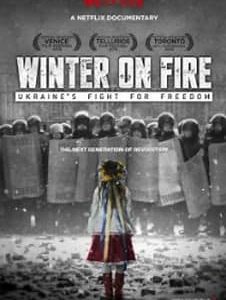Winter On Fire
 The Ukrainians are no strangers to resistance and deadly risk.
The Ukrainians are no strangers to resistance and deadly risk.
Linda and I recently watched the 2015 documentary about the protests that took place in Ukraine in the winter of 2013 – 14. That film is “Winter On Fire,” and it is available on Netflix.
It tells the story of the protests in the great public square, the Maidan, in Kyiv following President Victor Yanukovich’s 2013 bait and switch. Yanukovich had promised to enter into a trade partnership with the European Union, but under pressure from Russia he vetoed that plan and turned instead to an agreement with the Russian Federation.
The result was a massive three-month protest, accompanied by many violent clashes with police or the Berkut. In the end Yanukovich fled into exile in Russia.
Before that in 2004 – 05 was the “Orange Revolution” in Ukraine. This too was directed against Russia’s proxy, Yanukovich, who had rigged the Presidential election of 2004. The Orange Revolution protests led to new vote and the victory of Yanukovich’s competitor, Viktor Yuschenko, who held office until 2010.
All this to say, that the Ukrainian people are veterans of resistance and protest. Not only that — the protests have succeeded. Past protests have been non-violent — at least on the part of the protesters. Different ballgame now. Still, viewing the “Winter on Fire” film provides helpful background and context for the current situation. Watch it.
Another source of insight and perspective can be found in Ezra Klein’s recent interview with Fiona Hill. You will remember Hill as the dignified and articulate U.S. foreign service officer, then serving in Ukraine, who testified in the first Trump impeachment hearings.
What Hill speaks to in this interview is a point picked up on by David Brooks in his column later in the week, “Why Putin Can’t Back Down.” Putin is in the business of “identity politics.” Putin had been viewed to this point as a savvy strategist, taking calculated risks and outflanking the west. But, at least according to Hill, the sound strategist has now been eclipsed by the identity politician who sees himself as leading the white, Russian, Christian resistance against the infidels of the liberal West.
This explains Putin’s alliance with the reactionary Moscow Patriarch, Kirill, of the Orthodox Church. It also explains why the American right and Trump have been so enamored with Putin. They see him as fighting the same culture war they are. Hence the support not only of Trump, but of Steve Bannon, Tucker Carlson, and Josh Hawley, Madison Cawthorn to name a few. The Putin Fan Club, reaches deep into the Republican Party, enamored as it is of “The Strongman.”
But identity politics, and Putin’s self-perception as the savior of Mother Russia and Christendom, is a dangerous, if not entirely new, development. Strategic thinkers are amenable to reason and inclined toward caution in ways that Putin, the identity politician, does not appear to be. His is a holy war, from which as Brooks says, he cannot back down.
In these respects, the longstanding and once perplexing Putin – Trump connection becomes much more clear. Whether Putin and Russia “have something” on Trump or not, the two have a lot in common. Both have a sense that someone has taken something from them. In Putin’s case, the great Russian Empire. In Trump’s case, American “greatness.” Both wrap religion and race into the mix. Both work from a sense of grievance and seek to stir that among their followers. Both, astoundingly, see themselves as “victims,” and appeal to legions who nurture their own sense of resentment and grievance. “Make America Great Again,” is mirrored by “Make Russia Great Again.”
Trump’s early embrace of Putin was telling us a lot about Trump long before most of us got the message.
There’s, however, a warning here about the embrace of identity politics by those on the left. As the economist, Glenn Loury, sagely observed before the 2016 election, “Those who live by the identity politics sword, will die by it.” Two can play this game. Identity politics, which necessarily subordinates individual identity and freedom of thought to group identity, can be put in the service and cause of liberation or repression.
Putin and Trump have one other thing in common. Big-time Daddy Issues. Both were raised by harsh, distant fathers who framed the world as a relentless, winner-take-all competition. You are a winner or a loser. The only way to survive in such a world is by doing unto others before and worse than they do to you. That and by making up your own version of reality (“Stolen election,” “Stolen Empire,”) when actual reality doesn’t conform to your ego needs.
There’s a long-standing debate among historians, the so-called “Great Man” theory. Do “great men” make history or does history make some people “great?” However, you come down on that debate, it is clear that terrible, tortured men can alter the course of history and as they do, create suffering and mayhem far and wide.
![Anthony B. Robinson [logo]](https://www.anthonybrobinson.com/wp-content/themes/anthonybrobinson/images/logo.png)
![Anthony B. Robinson [logo]](https://www.anthonybrobinson.com/wp-content/themes/anthonybrobinson/images/logo-print.png)